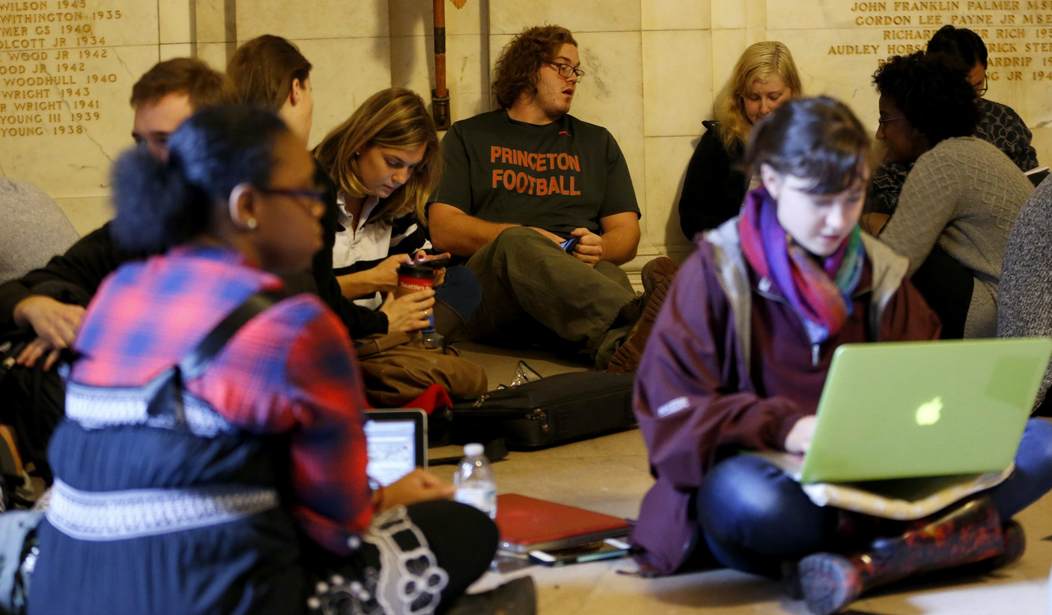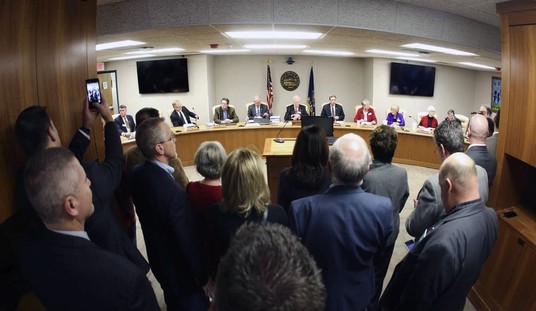Some on the left argue that the recent college squabble was caused, not by crazy demands for ever newer forms of “political correctness,” but by a conservative — reactionary — crackdown on the rights and livelihood of young people. As a millennial myself, I find it ironic that it is not conservative policies holding young people back from the middle class, but the liberalism these student promote.
From raising the minimum wage, to Obamacare, to the negative emotional and intellectual effects of “political correctness” on college campuses, liberalism is harming the young and decreasing their chances of rising in the world.
The College Freakout
According to Salon’s Amanda Marcotte, “Young people are under assault from reactionary forces and most of their grievances are not about imagined slights, but about very serious problems they are facing, on and off campus.” Ironically, Marcotte is right — but the “reactionary forces” truly at fault are those of the left, not of the right.
Marcotte turns to recent events at the University of Missouri, recounting the school’s brief attempt to take away health insurance subsidies for graduate students, and short scuffles with Planned Parenthood following the Center for Medical Progress videos. In these events, the Salon author sees a looming threat by right-wing nut-jobs. “The school was listening to and willing to interfere with the health care and educational access the students had, to pander to the whims of a bunch of delusional culture warriors,” Marcotte declares.
Marcotte connects this “attack on the young” to the culture war — with a clear message as to which side is in the wrong. But could she not have missed something fundamental in all of this? Young people are under attack from the left — arguably more than any phantom attack from conservatives.
Obamacare
“Even the war over Obamacare has a generational aspect to it,” Marcotte writes. She argues that, since Americans between 18 and 34 are the most likely to be uninsured, they “therefore have the most to gain under the Medicaid expansion and federal subsidies available through Obamacare.”
On the contrary, young people are caught in a trap — pay more for expensive coverage they are less likely to need, or pay a penalty for avoiding the “individual mandate.”
Before the Affordable Care Act (Obamacare) was enacted, the typical cost of insuring an 18 year old was one-fifth the cost of insuring a 64 year old. As Diana Furchtgott-Roth points out in National Review, this price difference made sense because “older people are at much greater risk of serious health problems than people just out of high school.” Nevertheless, since income generally rises with age, 64 year olds are likely better able to afford the higher premiums.
Obamacare mandates “essential health benefits,” such as maternity and newborn care and pediatric services, in every plan, even for a young, unmarried male. This drives up the cost of insurance — encouraging young people to accept the penalty rather than buy coverage they do not need.
The Minimum Wage
Like Obamacare, a higher minimum wage would disproportionately hurt young people. While it seems like a government mandate for higher wages would “give workers a raise,” it would really force companies to make a terrible choice — raise prices or drop employees who have become more expensive than the value they create.
Across the country, McDonald’s has already started replacing people with robots. Facing steep competition from “fast casual” restaurants like Chipotle, McDonald’s has to keep its edge, and that means lower prices. If government requires fast food restaurants to pay workers more, the restaurants will do so — but they can only make ends meet by hiring fewer employees.
While a higher minimum wage may sound like a raise, in the competition of the free market, it looks more like a pink slip — for both employees and businesses.
Kevin McNamee, owner of a small business in Los Angeles, CA — a city which recently voted to increase the minimum wage to $15 in 2020 — worries, “I can’t raise my product prices because of pricing pressure. I can’t reduce my expenses; in fact, salaries are my greatest expense, and $15 per hour increases my expenses and reduces my profit.”
McNamee claims “last year, my employees made more than I, the owner, did.” Small businesses like his will likely fail under a higher minimum wage.
Big businesses will more likely be able to stomach higher wages, but they will have to hire fewer workers to meet their bottom lines. Since young people have the least experience, they are most likely to fill entry-level positions — jobs that may become even harder to find if companies have to pay even the least experienced workers a high wage.
The Coddling of the American Mind
In the September issue of The Atlantic, social psychologist Jonathan Haidt and Greg Lukianoff, president and CEO for the Foundation for Individual Rights In Education, wrote about how the anti-speech movement on college campuses actually encourages psychological maladies and cognitive distortions.
Haidt and Lukianoff describe the rising culture of what they call “vindictive protectiveness.” They mention the case of Jeannie Suk, a Harvard Law professor, who wrote in The New Yorker about law students asking her fellow professors at Harvard not even to teach rape law — and in one weird case even to avoid using the world “violate” (as in “that violates the law) — because it may cause students distress. They also cite a professor whose fear of student reprisal led him to write anonymously for Vox, saying “I’m a Liberal Professor, and My Liberal Students Terrify Me.”
This culture of overreaction to words is slowly being institutionalized, Haidt and Lukianoff note. The recent resignation of University of Missouri President Tim Wolfe and the calls for the resignation of Yale’s Silliman College masters Erika and Nicholas Christakis confirm that the vindictive protectiveness movement is gaining strength.
Haidt and Lukianoff argue that “a campus culture devoted to policing speech and punishing speakers is likely to engender patterns of thought that are surprisingly similar to those long identified by cognitive behavioral therapists as causes of depression and anxiety.” In other words, “the new protectiveness may be teaching students to think pathologically.” Indeed, as they note, rates of mental illness among young adults have been rising, both on and off campus.
College campuses have embraced emotional reasoning, which Haidt and Lukianoff define as assuming “that your negative emotions necessarily reflect the way things really are,” and letting “your feelings guide your interpretation of reality.” Subjective feelings can be very unreliable guides, however.
“A claim that someone’s words are ‘offensive’ is not just an expression of one’s own subjective feeling of offendedness,” for example. “It is, rather, a public charge that the speaker has done something objectively wrong.”
The idea of “microaggressions” — small actions or word choices that seem to have no malicious intent but are thought of as a kind of violence nonetheless — twists the objective idea of being “offensive” into a subjective charge on behalf of someone claiming to be offended. According to some campus guidelines, it is a microaggression to ask an Asian American or Latino American “Where were you born?” because this implies that she or she is not a real American.
Haidt and Lukianoff cite many other instances where college campuses are moving away from free speech and toward an overly cautious worry about hurting students’ feelings. This trend, rather than helping those students who suffer from psychological disorders, actually worsens their plight — teaching them to think in ways that cause further depression and anxiety.
If a student has to watch her every word for fear of offending someone else, and in turn she can read offense into any statement by someone else — whether it was intended or not — her emotions will be on high alert. Vindictive protectiveness teaches students to think in ways that are not good for them, ill-preparing the young for a world that is not as attuned to their feelings.
As Haidt and Lukianoff explain, this teaching prepares students poorly for professional life, “which often demands intellectual engagement with people and ideas one might find uncongenial or wrong.” It can also hamper their intellectual development — as the free exchange of ideas is limited by a culture of overreaction.
There it is — the true threat to the youth. Liberalism in government makes health care mandatory and more expensive for young people and makes it harder for them to find a job, while in the university it prevents millennials from getting the training in thought and action they need to engage an ever-changing world. There is no bigger threat to young people than liberalism.









Join the conversation as a VIP Member